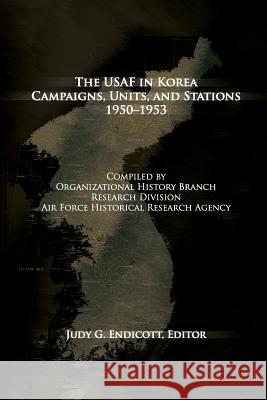The USAF in Korea: Campaigns, Units and Stations 1950-1953 » książka
The USAF in Korea: Campaigns, Units and Stations 1950-1953
ISBN-13: 9781477549742 / Angielski / Miękka / 2012 / 188 str.
In commemoration of the Korean War, the U.S. Air Force History Program published several works. One is this manuscript, a companion volume to the air war chronology entitled The USAF in Korea: A Chronology, 1950-1953, which details monthly and daily USAF activities and operations in the theater. This pamphlet, The USAF in Korea: Campaigns, Units, and Stations, 1950- 1953, provides information on the ten combat campaigns of the Korean War and gives an organizational view of tactical and support organizations carrying out combat operations. It also locates organizations or elements of organizations at their stations in Korea during the war and identifies designated K-Sites. The first part of the manuscript describes and illustrates the Korean service medal and service streamer and the ten designated campaigns of the Korean War. Accompanied by pertinent maps, the campaign narratives are general and selective rather than comprehensive, with each summary highlighting aerial combat. This section is extracted from Dr. A. Timothy Warnock's reference work Air Force Combat Medals, Streamers, and Campaigns (Washington: USGPO, 1990). The second section comprises briefs on the combat flying organizations and a selected number of combat support organizations that operated in the theater. In instances where the tactical group and wing of the same number began combat at different times, the first to enter combat is summarized first; if both began operational missions at the same time, information on the parent wing is given first. Each brief in section two contains an operational summary of a given organization's activities in the war, but specific information in the Chronology is not repeated here. Next, where pertinent, is a listing of flying or mission components. Following that is an organization's station list based on information in the organization's histories; in some cases, the station shown in the brief will not agree with the station listings found in the third section of. The commanders of groups and wings are listed next, and where applicable, Korean War campaign streamers, Korean War decorations, and Medal of Honor recipients are identified. The organizations' official emblems at the time of the Korean War appear with their descriptions or blazons. The third part of the manuscript contains the available official lists of Air Force units and organizations located in Korea, extracted directly from the bimonthly publication, Directory of USAF Organizations, issued by HQ USAF DCS/Comptroller. These listings date from July 1, 1950, which showed no USAF unit or organization located in Korea, to July 1, 1953, which listed stations and organizations located in Korea just before the end of the conflict. Unfortunately, we were not able to locate two issues of this series - May 1, 1951, and July 1, 1951. The issue of April 1952 was a special edition; then, the series reverted to bimonthly issues. These lists appear exactly as shown in the directories. The data contained in each issue reflects information provided by FEAF and other commands to the HQ USAF, Directorate of Statistical Services, Machine Accounting Division, through the end of the previous month. In some instances, the inputs did not specifically identify the location of an organization, leaving the reader to guess whether an organization was located in the town or at a nearby air base or airdrome. Rendering Korean place names in English inevitably results in a variety of spellings, and these lists are no exception. For example, the location generally known in USAF documents as Kangnung is in these lists consistently spelled as Kangnumg. The final section is a listing, both numerically and alphabetically, of locations in Korea identified as K-Sites. The place name spellings used are those found in Fifth Air Force general orders designating the K-Sites and other official Fifth Air Force documents. Also included is a map of Korea that approximately locates each K-Site.
Zawartość książki może nie spełniać oczekiwań – reklamacje nie obejmują treści, która mogła nie być redakcyjnie ani merytorycznie opracowana.











